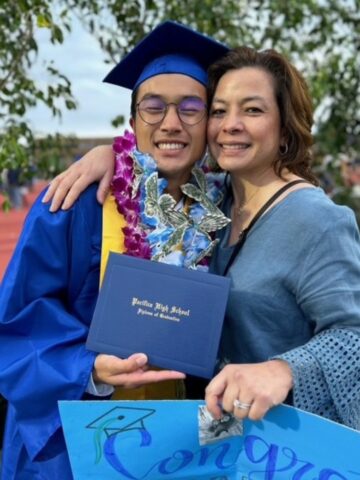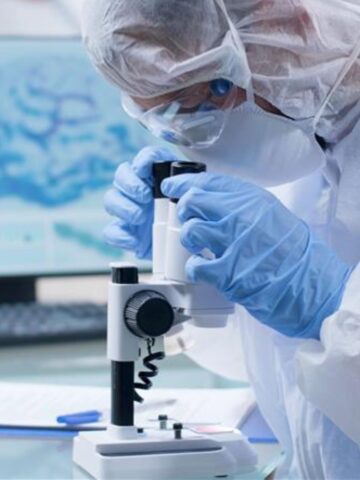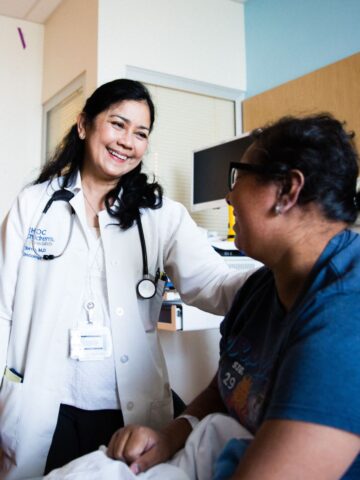Liliana Paez Gallardo was living a full life as a busy college student and sorority member with a part-time job.
She would awake at 5 a.m., lift weights, then go to classes.
After that she’d work at a retail store, go home, do homework, then sleep.
Rinse and repeat.
For the Cal State Fullerton sophomore, slowing down wasn’t an option.
Then the fatigue hit.
Liliana started skipping her workout and slept more.
Her appetite dwindled and when she ate, her stomach hurt.
She got winded walking up a flight of stairs for class.
Soon, she had lost 15 pounds.
“You need to see a doctor,” her mother told her.
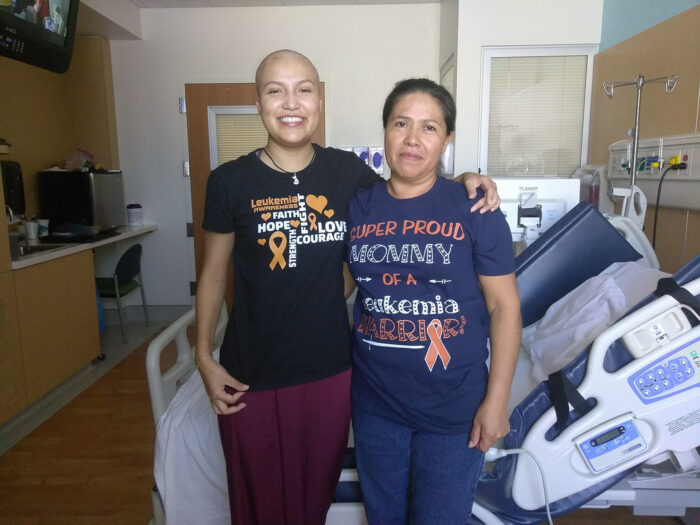
On May 30, 2017, just nine days before her 19th birthday, and right after the school year ended, Liliana – referred from an adult hospital to CHOC – was diagnosed with acute lymphoblastic leukemia (ALL).
All her life, for some reason, Liliana feared she would get cancer and die.
Now, it was happening.
If not treated, ALL, a rapidly growing cancer that starts in the white blood cells in bone marrow, would probably kill her in a few months.
“Most patients like Liliana come in and think, ‘I have a cold, I don’t know why I’m bruising, something’s off, or I think it’s just a respiratory thing,’” says pediatric oncologist Dr. Van Huynh, who initially treated Liliana. “Then they’re given this devastating news that they have cancer and their lives are completely altered from that moment on.”
Birthday in the PICU
Liliana had never been seriously sick.
Now, everything was happening so fast.
Dr. Huynh started her on chemotherapy.
Liliana spent her 20th birthday in CHOC’s pediatric intensive care unit (PICU) when her kidneys didn’t handle the medication well.
Her mother and two older brothers, as well as her sorority sisters, visited her.
Liliana doesn’t remember much.
“I was on a cocktail of drugs, so I was out of it,” says Liliana, who was involved in track and field, cross country, and soccer at Orange High School.
Most newly diagnosed patients with ALL are able to be discharged home one week after starting chemotherapy to continue their treatment as an outpatient. However, Liliana had a rougher initial course and spent about a month at CHOC before going home.
Despite her illness, Liliana was determined to finish college.
“It was a way of coping with everything,” she says.
During 2 ½ years of chemotherapy, Liliana earned her undergraduate degree in sociology with a minor in human services.
In 2020, she began working as a case manager in an intensive outpatient mental health program.
‘True altruism’
During her treatment at CHOC, Liliana was offered participation in oncology research studies – some led by Dr. Huynh.
Despite having every reason to think only of herself, Liliana thought of others who were in her condition – as well as future ALL patients.
“Liliana was on a very difficult two-year journey – there were lots of ups and downs,” Dr. Huynh says. “In the beginning, there are mostly downs, lots of valleys more than peaks.
“She was very sick during the first month of therapy. There’s also an adjustment period. From her perspective, her life stopped.
“As an adolescent young adult who is so vibrant, you have to think of the psycho-social component she experienced – the isolation.
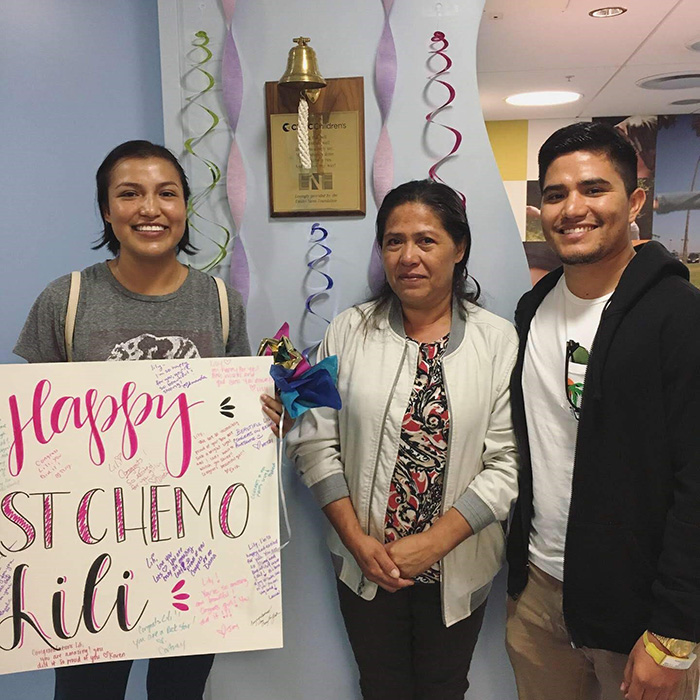
“Beyond the physical toll that a cancer diagnosis has on a patient, many do not realize the tremendous psychological impact a young adult with cancer endures. Liliana went through all of this and showed great resilience. And despite all she went through, she participated in these studies because of true altruism.”
Among pediatric and adolescent young adult cancer patients, improvements in survival have been attributed to enrollment in clinical trials.
Liliana says the decision was easy.
“While studying sociology as an undergrad,” she says, “I learned about how awesome research is and what people can do with it, so when they asked me I said, ‘OK, I will be involved – I’ll do it.’”
Liliana was getting her blood tested routinely as part of her chemotherapy care, so she thought it wasn’t a big deal for some samples to be used for research.
“If I could do this so maybe answers could be found in the future,” Liliana says, ‘why wouldn’t I do it?”
All in for CHOC cancer research and clinical trials
Dr. Huynh says there are various barriers to clinical trial participation for adolescent and young adults Many, she notes, are treated in the community setting, where there may be limited or no options to participate in clinical trials, which help to furthering science and improve survival.
Liliana, however, was all in.
One study led by Dr. Huynh involved monitoring asparaginase chemotherapy in ALL patients. Asparaginase is a key component of pediatric therapy for ALL but has several side effects. Dr. Huynh’s study looked at how patients responded to two formulations of the drug in an effort to maximize the effectiveness of this chemotherapy while minimizing the toxicity.
Liliana also participated in a Reducing Ethnic Disparities in Acute Leukemia (REDIAL) Consortium study led by Dr. Huynh at CHOC. This collaborative study, which began four years ago and is still ongoing, includes patients diagnosed with ALL at six major pediatric centers in the southwestern United States.
Hispanic children with acute leukemia don’t do as well on treatment as other non-Hispanic children. They’re more likely to experience worse therapy-related complications and have a poorer overall survival than kids of other ethnicities.
“We don’t know the answer to this yet,” Dr. Huynh says. “This consortium is looking to understand the biology of leukemia and what factors impact who will have complications to therapy. We hope this will ultimately improve the survival for not only children of Hispanic ethnicity but also those of any race or ethnicity. We’re also looking at environmental predispositions to the development of acute leukemia”
Liliana also signed up for a research study run by the Children’s Oncology Group (COG), the largest pediatric clinical trials group in the world.
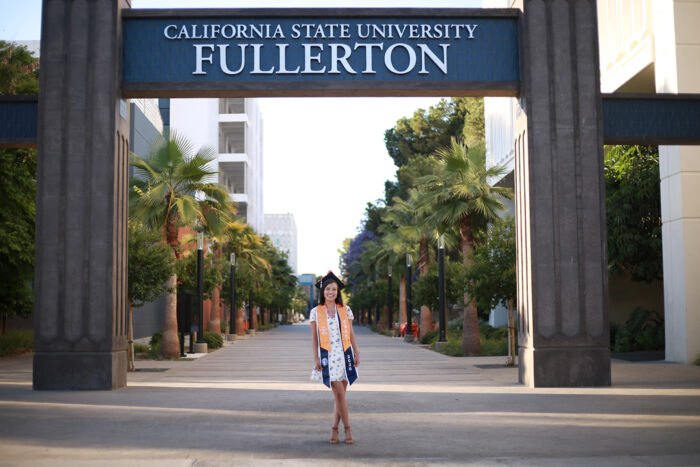
COG maintains a childhood cancer registry of infants, children, adolescents, and young adults with cancer called Project: EveryChild. This COG study collects demographic and epidemiologic information and takes extra tissue available from children who must undergo a diagnostic procedure and stores that tissue in a biorepository. Information on how effective the child’s treatment is maintained in COG’s data center.
Finally, Liliana signed up for VMC-Arm 2, an exploratory study of Voicing My CHOiCES, a tool for advanced care planning in young adults with cancer and other chronic illnesses. The study is sponsored by the National Cancer Institute and funded by CHOC philanthropic monies.
Working on master’s degree
CHOC philanthropic monies are helping Liliana in another way.
Now 25, she’s pursuing a master’s degree in social work at CSUF.
Her tuition would not have been possible without a 2022 Rachel’s Wish CHOC grant of $8,304.
The grant, provided by the Richard C. and Virginia A. Hunsaker Adolescent and Young Adult Oncology Child Life Program, supports cancer patients or closely related individuals who exemplifies a desire to further their education but may be facing challenges that prevent them from achieving their dreams.
Liliana, who hopes to serve pediatric cancer patients after college, also is a recipient of a $5,000 Cancer for College Frank the Tank scholarship in 2022 that is helping pay for graduate school.
While being treated at CHOC, Liliana was active in the hospital’s Adolescent and Young Adult (AYA) Treatment Program, and she remains an AYA volunteer and sits on its leadership panel.
She expects to earn her master’s degree in spring 2024.
“I loved my care at CHOC,” Liliana says. “I felt like I had so much support, especially from the AYA program. I made a lot of friends here. My family couldn’t understand everything I was going through. Everybody at CHOC was really nice, caring, and understanding.”
Liliana enjoys weightlifting and snowboarding with her boyfriend, a fellow ALL survivor treated at CHOC.
In addition to college, she works as an intern at a domestic violence shelter, counseling people one on one and in groups.
During her cancer journey, Liliana says there was a point when she didn’t know what was going to happen.
“I accepted I was mortal and that one day I was going to die, and I was fine,” Liliana says. “That’s the biggest thing I got out of this. I’m no longer afraid of dying. And during my journey, I never questioned why me. I believe God has a purpose.”
For more on CHOC pediatric cancer research and clinical trials

